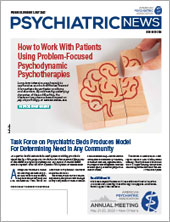The 988 hotline number for suicide and behavioral health crises goes live on July 16, and attendees at a plenary session at APA’s 2022 Annual Meeting were asked to indicate their awareness of this fact by a show of hands.
In a room full of psychiatrists, “it’s telling that not every single hand went up,” Sarah Y. Vinson, M.D., a triple board-certified psychiatrist, founder of and principal consultant at Lorio Psych Group, and a member of APA’s Scientific Program Committee, told the audience. The hotline seems as if it’s an attempt at a quick fix of bigger problems, she said, namely the increasing numbers of individuals with mental illness and the lack of resources to help people experiencing a crisis.
“It’s another example of something that sounds good,” she said. “But we haven’t really made the investment in the services that are needed—that ideally people would be connected to—by calling this number,” said Vinson, the co-editor of Social (In)Justice and Mental Health from APA Publishing. She said ideally callers could be reliably connected to housing, nutrition services, and other social supports and psychiatric care.
In a sit-down chat, Vinson and Peter Q. Blair, Ph.D., an economist and an assistant professor at the Harvard Graduate School of Education and principal investigator of the Blair Economics Lab, explored a range of topics, viewing them through the interdisciplinary lens of psychiatry and economics. In addition to the 988 rollout, the pair touched on many subjects, including incorporating the social determinants of mental health into the practice of medicine, the incarceration of people with mental illness, and addressing the shortage of mental health workers.
As the starting point for the session, Vinson provided the World Health Organization definition of mental health: A state of well-being in which individuals are able to realize their own abilities, cope with the normal stresses of life, work productively, and contribute to their community. Blair pointed out that from an economics standpoint, mental health is also a form of capital—a tool as valuable as smartphones or desktop computers—because it makes individuals more productive. “That makes it worth investing in,” he said. “Mental health impacts how you think about yourself and the stories that you tell yourself.”
Mental health is about more than the mere absence of psychiatric symptoms; it also includes the ability to realize one’s capacity for agency and contribute to the larger society with dignity, Blair said.
Hardships such as living in poverty, being without food, or being unemployed for long stretches seriously impact one’s mental well-being, Blair pointed out. “It’s important to think not just about the prescription of pharmaceuticals, but also how to change people’s social environments and economic environments to reduce their mental health issues.”
“Business as usual is not resulting in extraordinary outcomes for people,” Vinson said in agreement. “We know more about the brain now than we have ever known, and we have more psychiatric medications than we have ever had. Yet at the same time, for the first time ever, the surgeon general has declared a youth mental health crisis. There’s a disconnect between what we know and the health of our populations, and I think it’s because of these broader social issues we’re missing.”
Blair said that after a lengthy focus on obtaining advanced degrees and highly specialized training, physicians can sometimes forget to “foreground people’s individual stories” and think about the communities people come from or grow up in. “At the stage where we all are, it’s important to think about the stories of the people who motivated you to do the work that you’re doing. Once you start to reflect on that, you understand how people’s social context influences what brings stress in their lives and how that can contribute to mental health crisis.”
The pair turned to a discussion of resolving the shortage of psychiatrists and mental health professionals. “There’s a real tension between what we know society needs and the path we need to take to provide more mental health services,” Vinson said. “Our field wants in some ways to protect its turf and safeguard the way we deliver care, … but at the same time we’re recognizing that the status quo is falling short of society’s needs.”
Blair suggested that the profession could reexamine the number of seats in medical schools and the number of residency positions in this country. “So many highly qualified applicants must now wait in line,” he said. At the same time, he pointed out that a lot of training of health care workers happens on the job. Nurses or nurse practitioners under supervision could potentially be trained to expand their role, freeing up physicians to focus solely on the piece that requires their advanced training.
“There’s a huge gap between what the labor market possesses and what society needs,” he continued. For example, only 40% of the U.S. labor force has a college degree, but close to 75% of job postings for open positions require one. “To run a private practice or care facility, how many of the tasks are learned in school versus could be done by people who didn’t go to college? … In our society, we’re effectively shutting out a whole pool of skilled workers with years of experience.”
Vinson and Blair presented a plenary address at APA’s Mental Health Services Conference last fall. At that meeting, Blair noted that even among people with the most serious mental illness, most want to work. “For people with mental health challenges, having access to work can be a form of dignity that can itself be a form of treatment,” he said. He discussed the role of educational opportunity, occupational skill attainment, and meaningful employment as instrumental components to mental health. ■

